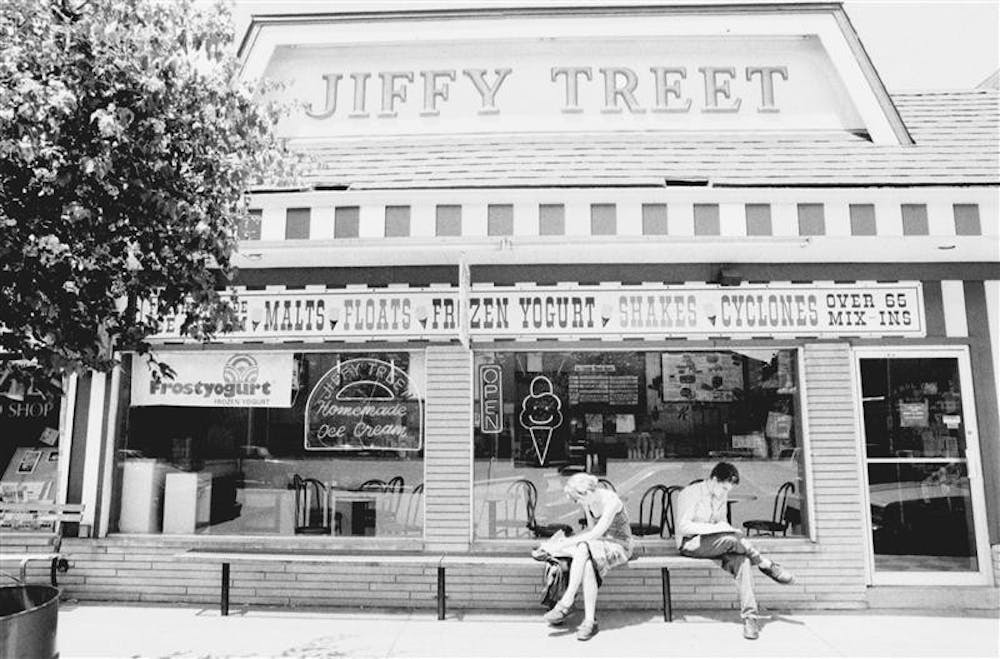Sarah Fater remembers the Kirkwood Avenue of years past.
It was a place where visitors could pop into the local Jiffy Treet for a cone, catch a film at the Von Lee Theater or slide into a booth at the independent diner, Ladyman’s Cafe.
Now the co-owner of Greetings gift shop at 429 E. Kirkwood Ave. said she sees a change taking place on the street, and she doesn’t necessarily like it.
Chain retailers and restaurants such as Dunkin’ Donuts and Panda Express are moving in, and as a result, she said Bloomington’s local character is losing out.
“Do we really want to have an outdoor strip mall on Kirkwood? I don’t think so,” she said. “That’s basically what it’s turning into.”
Others agree, questioning the street’s future.
“The chain outfit kind of takes away from the uniqueness of Kirkwood.” said Larry Perry, longtime owner of the Ritz Barber Salon at the corner of Dunn Street and Kirkwood.
In the past 10 years, the city’s most visible street has undergone dramatic change as big-name chain restaurants and retailers have set up shop and some smaller, local ones – including Jiffy Treet, Ladyman’s and others – closed.
In 2007, the Tartan Realty Group, a Chicago-based developer, reopened the historic Von Lee Theater with a combination of ground-level retail space occupied by Noodles & Co. and Dunkin’ Donuts and offices on the upper levels.
That same year, the company also opened the upscale Flats on Kirkwood apartments, ranging in price from $800 for a studio to $2,700 for a three-bedroom unit per month. A Panda Express restaurant sits on the first floor of the property.
Wilhelm Kreuzer, a principal at Tartan Realty Group, said his company’s properties are popular with students and don’t detract from the fabric of Bloomington.
“You can’t say what’s lost its local flavor,” said Kreuzer, an IU almunus who graduated in 1996 with a degree in real estate and finance. “Our goal is to put certain restaurants and do certain things that betters the community, and you can’t make everyone happy.”
It would be alarmist to say Bloomington is suddenly being overrun by large corporations, said Talisha Coppock, executive director of Downtown Bloomington Inc. Last year, four chain businesses opened in the downtown area while 43 independent shops opened, she said, including the local restaurants FARMBloomington and Finch’s Brasserie on Kirkwood. Coppock said that number includes a large range of different types of businesses in the entire downtown area.
The idea that Bloomington is losing local businesses may simply be a perception problem, said Danise Alano, the city’s director of economic development.
“I think people notice when a new chain opens, but do they notice when a new independent shop opens?” she asked. “I don’t know.”
She said it’s the city’s intent to maintain the “quirky, entertaining Kirkwood Avenue personality” that helps to define the area.
In 2006, the city designated Kirkwood as a part of the Bloomington Entertainment and Arts District, meaning officials pay special attention to the street’s distinctive culture through grants and special signage or branding.
But some change is inevitable, given the constant turnover in students, she said.
“Student spending swings,” Alano said. “Are (students) used to Indiana brands, or are they coming from other states and they want to see what they have at home?”
Blake Gumprecht, associate professor of geography at the University of New Hampshire and author of “The American College Town,” said the changes in Bloomington could represent a growing trend in college towns around the country.
“I agree on the one hand that college towns, even in their downtown sections, are seeing an infiltration of chain stores,” Gumprecht said. “It almost happens inconspicuously, because often these stores aren’t recognized as chains.”
At the University of Notre Dame, for instance, Indianapolis-based Kite Realty Group is working on a $200 million project spread across 25 acres adjacent to campus.
Once completed, the project will include retail space, offices and five different types of housing options, said Ashley Bidell, a Kite project manager.
The first portion of the project will open in the fall. Restaurant tenants include Philadelphia-based Kildare’s Irish Pub and Doc Magrogan’s Oyster House, a high-end seafood restaurant and raw seafood bar, and Hot Box Pizza.
Local businesses will also be a part of the mix, Bidell said.
But one Notre Dame graduate student, Thomas Klepach, criticized the plan, saying it doesn’t represent the culture of South Bend.
“It is another example of ugly American suburbanism,” Klepach said in an e-mail. “It is also an attempt for Notre Dame to further sequester its students on campus and prevent them from actually experiencing the city of South Bend.”
At the University of Illinois in Champaign, Ill., Green Street is dramatically changing as housing developers build urban high-rise apartment buildings in the middle of an area with a traditional small-town feel, said Michael Andrejasich, associate dean of the College of Fine and Applied Arts.
The Kirkwood-like street has local restaurants that have become more commercialized in recent years.
“Students today have certain expectations about lifestyle and the kinds of amenities that exist in the environment ... whether it’s eating choice or entertainment choices, whatever,” Andrejasich said.
Back in Bloomington, Fater of Greetings said she’s thinking about making T-shirts telling residents to “Keep Bloomington Weird.”
She’s also encouraging locals and students to support independent businesses.
But with rent rising on Kirkwood, she’s nervous about the street’s future, fearing more chain stores will move in.
“My guess is that the Kirkwood that we’ve known since the ’70s and the ’60s is probably a thing of the past,” she said, “and I don’t necessarily think there’s anything anybody can do about it.”
Commercializing Kirkwood: Will it ever be the same?

Get stories like this in your inbox
Subscribe





